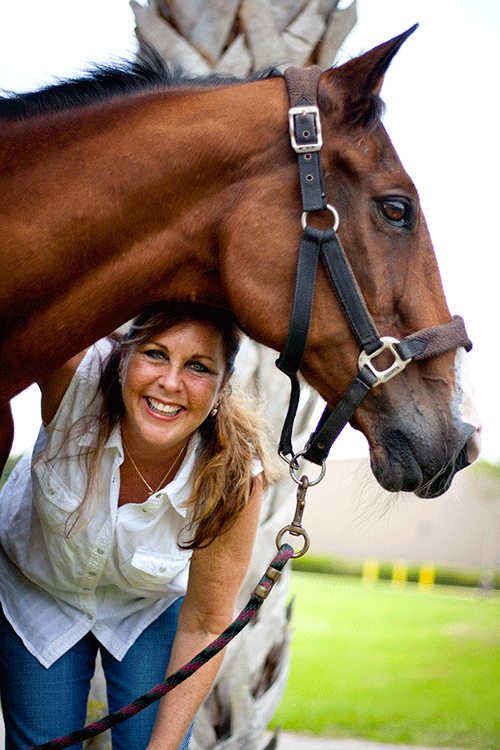
When a 30-year-old Quarter Horse named Bayla was brought to the UF Large Animal Hospital for treatment of a condition known as choke, the outlook didn’t look good. Bayla’s esophagus had been obstructed for approximately 12 hours and despite the best efforts of multiple veterinarians at home, she was not getting any better.
Her owner, Katelyn Qualey, met Dr. Louise Husted, a resident in large animal internal medicine, and Dr. Sarah Reuss, large animal internal medicine service chief. They explained to her that choke is a term used when the esophagus is blocked.
“In horses, choke is usually caused by impacted food material that obstructs the esophagus and may cause the lining to ulcerate or die,” said Dr. Reuss. “Because of the obstruction, horses cannot swallow food, water or saliva and these all drain out the nostrils instead. There are many possible causes of choke, such as dental problems that prevent horses from chewing properly. Bayla was missing teeth, so that was most likely a cause.”
One complication of choke is aspiration pneumonia, caused by saliva and feed that are normally swallowed but enter the lungs when the esophagus is obstructed. Bayla already had signs of aspiration pneumonia when she arrived at UF, and Dr. Husted also found a heart murmur and signs of equine Cushing’s disease, which would suppress her immune system.
The UF veterinarians performed an esophagoscopy to see what was blocking Bayla’s esophagus. The exam revealed a large grass bolus in her esophagus. Saliva could also be seen in her trachea, confirming aspiration.
“Initially, flushing and multiple attempts to dislodge the obstruction with a tube through the nose were unsuccessful,” Dr. Reuss said. “So we talked with Katelyn about making an incision over the esophagus to infuse saline directly into the blockage to relieve the impaction and then manually massage the food bolus down the esophagus and into the stomach.”
Board-certified anesthesiologists monitored Bayla closely to ensure that she handled the anesthesia well while Dr. David Freeman, chief of UF’s large animal surgery service, and his team performed the procedure. They were able to relieve the obstruction without making an incision into the esophagus.
Once completed, an endoscopy was performed to confirm the resolution of the obstruction, and Bayla recovered from anesthesia without problems. Unfortunately, there was a 10-cm-long mucosal defect in the lining of her esophagus that spanned the entire circumference. This made her very likely to develop problems as she healed, UF veterinarians said.
They recommended strict dietary care for Bayla, influenced by the severity of the choke, her age and aspiration pneumonia.
“Bayla’s recovery was amazing after her discharge from the hospital,” Qualey said. “She had limited grazing on short grass, which allowed her to maintain maximal mental health and also allowed her to exercise her jaw muscles. She is such a strong girl, I never had any doubt that she would make a full recovery.”
At Bayla’s follow-up appointment, Dr. Reuss performed an endoscopic examination, which revealed a normal esophagus.
“Katelyn was feeding Bayla mashes with no dry hay during the healing process,” Dr. Reuss said. “I was very happy with her progress and Katelyn’s commitment to her recovery. Bayla is a wonderful example of the fact that age is not a disease. So many things could have gone wrong during her treatment and recovery, but she has defied all of the odds.”
The veterinarians and staff at the UF Large Animal Hospital were glad to see Bayla’s notable progress, and Qualey couldn’t be happier with the extra time she gets to spend with her equine senior.
“Bayla has a strong spirit and great strength of heart,” Qualey said. “She continues to amaze me with her daily antics and comical personality. She looks good, feels good and can still run with the wind.”
View all UF Large Animal Hospital Success Stories.





